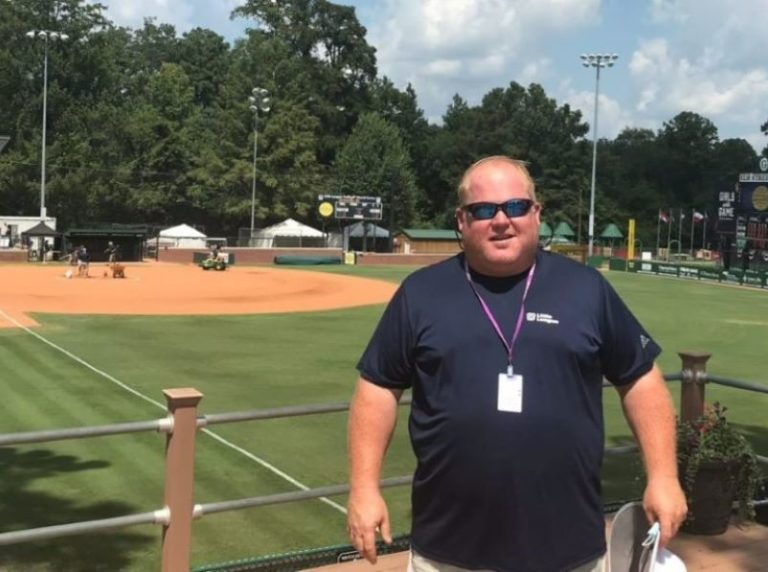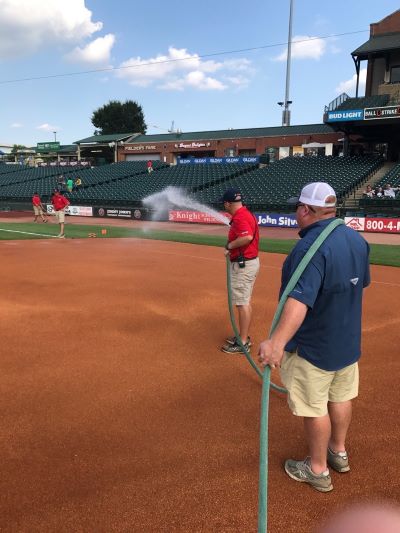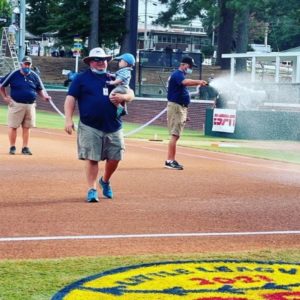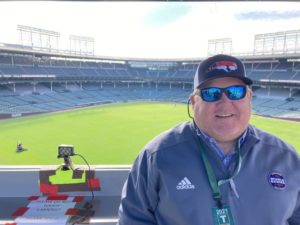In this edition of the SportsField Management Interview, we meet Chris Ball, CSFM, sports field account manager at Ewing Irrigation & Landscape Supply. Ball previously served as the Myrtle Beach Pelicans’ director of sports turf management from 2002-11, during which Myrtle Beach’s BB&T Coastal Field was named Carolina League Field of the Year for five straight seasons. He was named the Class-A Sports Turf Manager of the Year – presented by Minor League Baseball and the Sports Turf Managers Association (STMA) – in both 2007 and 2010. From 2011-17, Ball was sports turf manager in Gwinnett, Ga. (Triple-A affiliate of the Atlanta Braves organization), where he was awarded the Triple-A Sports Turf Manager of the Year award by Minor League Baseball and STMA.
SportsField Management (SFM): Please tell us a bit about your background, as well as your path in the sports field management industry.
Chris Ball, CSFM: My path is a little different from a lot of people. I did not go to school for this. I have a baseball background. I’m originally from Greenville, North Carolina. I played baseball throughout high school, and wanted to play in college. I went to UNC Greensboro (UNCG). I did not end up playing in college, but I wanted to stick around the athletic program. My college experience started as a student assistant. We did not have an on-campus stadium, so we practiced at a local high school, and we played our home games at War Memorial Stadium in Greensboro, which, at that time, was the oldest active minor league park in the country. Part of my daily routine was to set up practice. We had an old John Deere riding rotary mower, and another mower that we took the deck off of to drag the infield. I found a love for being outside and being hands-on on the field. I got to know the head groundskeeper at War Memorial, Mel Lanford. Mel became a great friend of mine, and someone whose lead I took to get into the industry. I learned how to edge. I learned how to mow. I learned how to pack a mound and a plate. It was a good way for me to be involved with the game of baseball without being a player.
Around my junior year, Mel would throw me the keys on a Friday afternoon, and say, “I’ll see you on Sunday.” We would play Friday, Saturday, Sunday series or double header on Saturday and a single game on Sunday.
Our head coach at UNC Greensboro, Mike Gaski, took a lot of pride in the practice facility. He let me get my hands dirty, and screw some things up, and learn the why and the how. We would have good conversations, situationally, about things like our second baseman liking the playing surface firm, or our third baseman being bigger, so we needed to slow the ball down.
During my senior year, the state of North Carolina passed money for us to build a stadium on campus. My degree is in parks and recreation administration. It just so happened that I was going to go to graduate school at UNCG, and I could get 6 credit hours per semester paid for if I worked at the university. I got the job as facilities manager of the new stadium, and started my grad school classes. I did not finish grad school. I fell in love with the baseball piece of the industry. After about a year and some change, I left UNCG and took a job in Harrisburg, Pennsylvania, with the Senators (at the time the Double-A affiliate of the Expos). Tim Foreman, the facilities manager, had the same philosophy that Mel did. He said, “We know you have a lot to learn, we want you to learn. It’s an old stadium with a lot of nuances. Enjoy it!” So, I was in Harrisburg for two years.
I was a fish out of water in Pennsylvania, so I ended up moving back to Greensboro and took a job with a turf and ornamental supply company as a sports field specialist. I got a technical turf education on fertilizers, chemicals, control products, and irrigation parts during those 18 to 24 months. From there, I went to work for the City of Greensboro for a little bit as a supervisor of about half of the athletic fields for their parks system.
I got a phone call from Nolan Thomas in 2002 to let me know the Myrtle Beach Pelicans were looking for a field operations manager, and asking me if I knew anyone who would be interested. I thought about it for a couple of hours: Myrtle Beach, the Braves, back in baseball…I might know a guy. I called Nolan back a couple hours later and said I would be interested. I started with Myrtle Beach in 2002, and I had an awesome career there. I was there from 2002 to 2011. Five consecutive FOY awards in the Carolina League, two national STMA awards there, a number of fantastic assistants and interns.
I got the chance to go to Gwinnett [Ga.] in 2011. Again, had a great run there. Field of the Year in 2013 and the Triple-A award from STMA. All but one of those years with Myrtle Beach and Gwinnett, I was with the Braves (we were a Rangers affiliate one year). The Braves were a great place for someone like me to be involved. They had such a great run. With all the players that bounced up and down to Myrtle Beach and Gwinnett, it was a really cool time to be involved with the Braves franchise.
In the winter of 2016, I just kind of ran out of gas as the baseball world goes. I spoke with the guys from Southern Athletic Fields, and they had said to let them know if I ever wanted to get into the sales side. I said, “I will give it another year and see what happens.” Then, in early spring, when I was doing all my ordering, we spoke again, and I got out of professional baseball in June of 2017.
In April of 2018, Southern Athletic Fields was bought by Profile Products (Turface). I went from covering the Carolinas and north Georgia to being the market development manager for the Southeast and beyond. That let me play on all the relationships I built during my time in baseball. I never felt like I was making a sales call. I was just going to reconnect and network with people, and support those field managers with whatever they need.
In 2021, I left Profile and started with Ewing. I am sports field account manager for North Carolina, South Carolina, north Georgia and beyond. I go wherever they need me to go. I was a customer of theirs when I was in baseball. I struck up a really good relationship with Jeremy Bohonko, who is Ewing’s regional manager for the Carolinas. Jeremy and I have been friends for a long time. Ewing is an awesome company.
So, my career path is a bit different from the norm.
SFM: Can you give us some insight into your current job and your typical day to day?
Ball: Ewing has a massive catalogue. In the sales world, you can’t be everything to everybody. You have to find a niche of what you are good at and what you can help customers with most. I deal with a lot of custom accessories – padding, windscreens, tarps, custom graphics, etc. I do a lot of baseball-specific tools – rakes, drags, tamps – and then also infield mixes and clay products.
I typically see between six and 10 facilities per week. I fly every once in a while, but I put a lot of miles on the truck. I do professional parks, Division I colleges and universities, municipalities and whatever else.
SFM: What is the best part of your job?
Ball: I get to visit with my friends on a regular basis, talk shop and catch up on them and their families. We have a lot of really great people in this area, and that’s what makes it special.
SFM: What’s the biggest challenge you face?
Ball: When I was in Myrtle Beach, I had 13 or 14 different vendors who would call on me. When I was in Gwinnett, I had a dozen. And that’s the same thing I face now on the sales side – there is a lot of competition out there. It’s a good thing, but there’s also a bottom line.
Also, having enough time in the day, week, month and year. I’m a new father. I’ve got an 18-month-old. I got out of baseball to hone in on my life, and this has allowed me to do that. But it still encompasses a lot of time with what we do as vendors.
SFM: You touched on it a bit, but what was the transition from practitioner to the commercial side like for you? And what advice do you have for others making that transition?
Ball: It was scary. I didn’t know what to expect. I knew the catalogue that we had very well. But I had done minimal emails, no spreadsheets, no CRM programs. You have different stresses. Is everyone going to see right through you? Are you going to come in and give bad information or bad advice? Then there is the fear of rejection – going someplace and being told that you don’t need to come back. You go from being laser focused on two acres to now having to focus on helping a huge amount of people across an entire region.
In our business, one of the coolest things is that everybody – for the most part – is available. They are going to return a phone call, email or text, because we are all striving for the same thing: the safety and playability of our facilities. We want everyone to play on incredible surfaces.
I miss being a practitioner every day. But I do get to keep my hand on the pulse a bit. I’m involved with the Little League Softball World Series. They are here in my hometown. So, I’m the volunteer coordinator for the field staff. I helped out at the NCAA regionals, the SEC tournament, the ACC tournament, just to scratch that itch. Just because you are out of the day-to-day operations doesn’t mean you are out in any way, shape or form.
But I’m not looking back.
SFM: You already mentioned some people who have had an impact on you. Would you say that those are the folks who were the most influential on your career?
Ball: I would say that Mel Lanford is the number one reason I took an interest in sports field management. Mike Gaski would be the number one reason I’m in this industry. Jake Holloway and I have been friends for almost 27 years. Having your best friend in the world in the same industry and be able to bounce stuff off each other all the time had a lot to do with it. Nolan Thomas is the reason I got back into pro baseball. I owe him to this day, because he solidified my career. And then countless other people in the Carolinas and throughout the Southeast. Your industry partners become your close friends. There really are too many people to mention – I’ve got connections across the country, and I’m thankful for them every day.
SFM: You also mentioned some of the FOY awards and other accolades? What would you say are your biggest accomplishments in your career or the things of which you are most proud?
Ball: Those awards were great, but they were group awards. I give a lot of the credit for those awards to the ladies and gentlemen who were assistants of mine. They listened, took my advice, and ran with whatever decisions we made. A lot of people who worked with me are still in baseball. McClain Murphy is in Gwinnett. Andy Burnette is with the Pirates in Bradenton (Fla.). Greg Jones is in Miami with the Marlins. Evan Mascitti was with me for a year; he’s at Penn State getting his Ph.D. Tracy Schneweis is at Oklahoma State. Phil Grefrath is with Sports Field Solutions. At one of the national meetings – 2017 or 18 – I had nine guys there who were still involved in sports field management. They came in, worked their tails off for me, and now they have carried their careers on to bigger and better things.
SFM: You also achieved your CSFM. What does that mean to you, or why was it important to you to achieve certification?
Ball: I got it after I got out of baseball. It was a culmination of that point in my career. Having the longevity in the industry. Because I don’t have a degree in turfgrass management or turfgrass science, it was an exclamation point on the end of my baseball career.
SFM: You weren’t really headed toward this career, but got into it because you wanted to stay involved with your sport. What is the key to getting the next generation of high school and college students interested in a career in sports field management?
Ball: The biggest issue we are facing now is recruitment and retention of qualified employees. There have to be a lot of boxes we look outside of when it comes to finding people. You look at each college baseball team, and they all have student managers and student assistants. There are “field rats,” if you will – kids who are always around the field and want to learn how to chalk a line or operate a mower.
A lot of times we get distracted as head field managers thinking that we can do it all. My philosophy was to put these new people on every piece of equipment. Teach them how to drive a manual transmission vehicle. Teach them how to drive a tractor. Show them how to change oil. Let them take ownership of learning. Let them fail. I can’t tell you how many times I put diesel in a gas engine. You have to let them fail and you can’t bite off their heads. You have to keep it enjoyable.
SFM: How do you think the industry will evolve over the next decade, and what would you most like to see in terms of industry advancement?
Ball: I would like to see salaries go up. For the amount of time sports field managers put into their craft, they are not rewarded enough monetarily.
I would like to see a resurgence of natural grass. I think synthetic turf has a place, but natural grass is better for the environment. There are beautiful pieces of property throughout the country where they have taken the beauty away by putting the rug in.
I also think women are going to find a bigger place in the industry. We are working to get an all-female field crew involved with the Little League Softball World Series.
SFM: You deal with a lot of people in a lot of different situations. What are the biggest things your clients are facing?
Ball: Obviously, what we’ve gone through the past couple of years. We are not an equipment company, but I know there are challenges getting parts or pieces of equipment. The cost of goods has gone up. So, there are things that people are doing without right now. Who knows what will happen with fertilizer prices? The seed ordeal started before this. We also see a shift in what chemicals we can and can’t use. And then there’s the employee shortage. As of today, I believe there are five or six minor league teams that are still without a sports field manager. The situation is dire. Something’s got to give. We’ve got to start getting workers.
SFM: Outside of work, can you tell us about your family, your hobbies and your interests?
Ball: We’ve got an 18-month-old son, Brady. That has been a life-changer for me. I love the outdoors. I love to hunt, and I love to fish. I do chase a little white golf ball once in a while. Being in eastern North Carolina, we are close to the coast, so I’ve got saltwater in my veins. I’m fortunate that I live in my hometown. My family is here – my brother and my mom and dad. My wife is a local girl. We’ve got East Carolina University here in town, so we are Pirates. I still love baseball. I don’t have a ton of close friends here in town; but across the country, I’ve got close friends everywhere.
SFM: Is there anything I might not have touched on?
Ball: I’m a big proponent about taking care of your skin. That is one thing that is often overlooked until it is too late.*
* To read Chris’s article on the topic of skin cancer prevention, from the May issue of SportsField Management magazine, click here.






